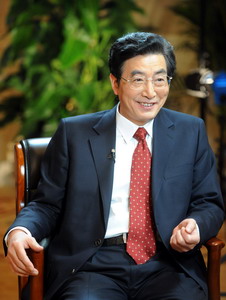Newsmaker
Beijing mayor vows to end capital's traffic jams
Updated: 2011-01-18 15:03
By Xu Fan (China Daily)
|
 |
|
Guo Jinlong is mayor of Beijing |
BEIJING - The mayor of the capital city has vowed to work hard to end chronic traffic gridlock in five years.
Guo Jinlong, who took office as Beijing mayor in 2008, said traffic jams are a common problem for most big cities around the world.
"The downtown in Beijing has been under more and more transport pressure with the fast growth in the use of cars," he said in a written interview with China Daily.
"The government has taken and will always take it as one of its most important tasks to ease traffic jams in the city."
His remarks came after the latest measure on car license application limitation was released last month.
He said the overall target, which is to ensure the safety and normal use of the city's traffic system, will be realized through improving the traffic flow on the main roads in the downtown area and stopping congestion from worsening in core areas.
While the daily number of passengers commuting by public transport has increased from 12 million in 2005 to 20 million, Guo said the government aims to raise the current ratio of people using public transport from the current 40 percent to 50 percent by 2015.
| ||||
Since 2005 the rail system in Beijing has increased by 222 kilometers to reach 336 km. The city will invest 500 billion yuan ($75.8 billion) in building new rail lines in the next five years and expects to have more than 1,000 km of rail lines by 2020.
Meanwhile, the policy of keeping ticket prices low has encouraged citizens to take public transport. The optimization of 503 bus lines has solved transport problems for residents in 720 communities.
In addition, the government will work to reduce vehicle emissions and improve the safety of the capital's transport system over the next five years, according to Guo.
He said the structure of the city also contributes to traffic congestion.
"As there are historical and cultural heritage sites spread throughout the city center, the main traffic lines cannot cross the downtown area to form a radial transport network," he said.
E-paper

Ear We Go
China and the world set to embrace the merciful, peaceful year of rabbit
Preview of the coming issue
Carrefour finds the going tough in China
Maid to Order
Specials

Mysteries written in blood
Historical records and Caucasian features of locals suggest link with Roman Empire.

Winning Charm
Coastal Yantai banks on little things that matter to grow

New rules to hit property market
The State Council launched a new round of measures to rein in property prices.



